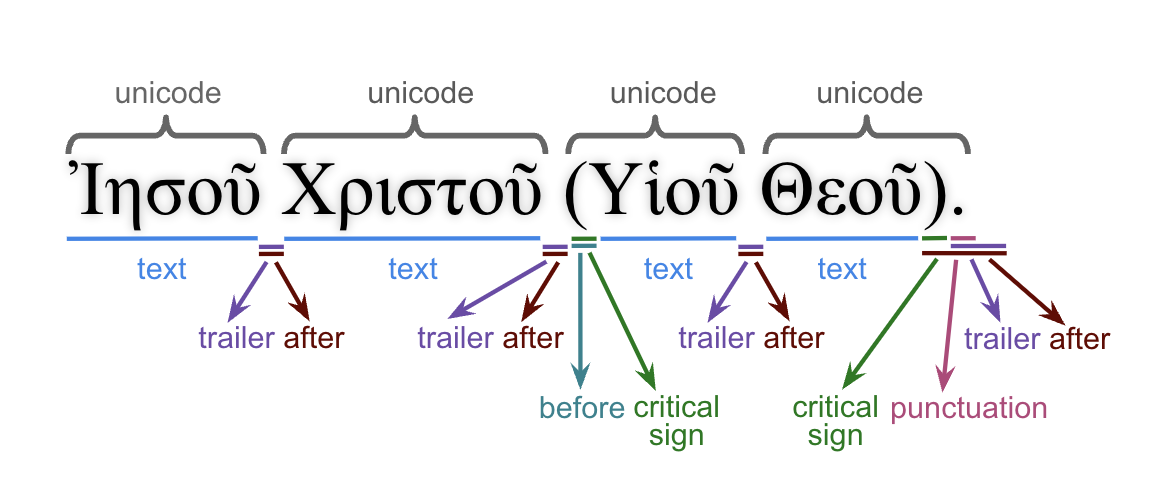N1904addons

Additional features for the N1904-TF, the syntactic annotated Text-Fabric dataset of the Greek New Testament.
About this datasetFeatureset
Loading the dataset
Use cases
Latest release
N1904addons - Feature: betacode
| Feature group | Feature type | Data type | Available for node types | Feature status |
|---|---|---|---|---|
Morpheus |
Node |
str |
word |
✅ |
Feature description
The Greek unicode surface level word in Beta Code. It is important to realize that this feature is not a transliteration of N1904-TF’s unicode. The feature can be rather considered a translateration of the text feature. The following image shows the relation between the various lexographic features in the N1904-TF dataset.

For instance, where feature unicode would contain ‘Ἀβραάμ.’ in our conversion to betacode we will map it to ‘*)abraa/m’, so without transliterating the trailing period.
Beta Code is used in specific applications like Morpheus morphological tagging.
Usage in TF queries and Python
When working with string values for feature betacode in Text-Fabric, you may encounter characters that interfere with your queries or code. The type of interference differs between using betacode in a Text-Fabric query template or a ‘plain Python’ environment. In a Text-Fabric query template the | functions as OR operator, while in plain Python the backslash \ is normaly used to signify an escape.
Text-Fabric Query Template:
Here it is adviced to escape the | character (that is replace it with \|). A raw string indicator r should also be added before the query template definition to prevent warning messages. To examine all constraints see TF searchusage. In example 1 the query template is defined to locate occurences of the Beta Code a)pokatalla/ch|. This query correctly retrieves the single occurrence of ἀποκαταλλάξῃ, found in Ephesians 2:16.
# Example 1: Text-Fabric query template
betaCodeQuery=r"""
word betacode=a)pokatalla/ch\|
"""
Plain Python
However, when performing a ‘plain Python’ compare do not escape the | character. Instead, escape the backslash \ character by replacing it with a double backslash \\. Failure to escape these inherent backslashes can lead to silent errors, except when the backslash is the last character in the betacode (e.g., kai\, which will result in an unterminated string). See also example 2 and 3 below.
# Example 2: Plain Python string compare
for wordNode in F.otype.s('word'):
if F.betacode.v(wordNode)=='a)pokatalla/ch|': print (wordNode)
# Example 3: Escaping backslash in plain Python
for wordNode in F.otype.s('word'):
if F.betacode.v(wordNode)=="kai\\": print (wordNode)
See also
Data source
GitHub repository Create_TF_feature_betacode